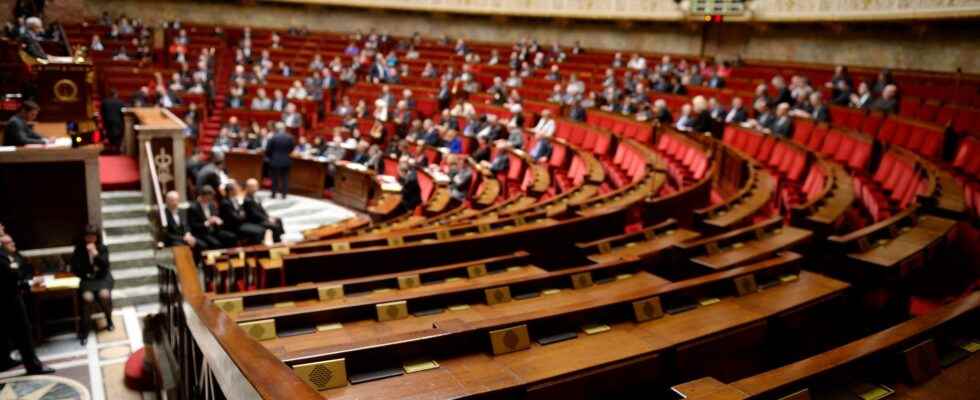An obligation to install solar panels in large outdoor car parks, new exemptions for installations on the coast… The National Assembly adopted on Friday December 9 a series of provisions of the bill aimed at accelerating the production of renewable energies .
The first reading examination, which began on Monday December 5, continued on Friday without major setbacks for the presidential camp, which made several compromises with the left as a pledge of goodwill to obtain its support for this text. Update on the main measures adopted, before the resumption of the examination of the text on Monday.
- The obligation to install solar panels in large outdoor car parks
In the evening, the deputies adopted with 42 votes against 6 a measure making it compulsory to install photovoltaic shade structures in outdoor car parks of more than 1,500 m2. The government initially defended a threshold of 2,500 m2, while environmentalist and rebellious deputies asked to go down to 500 m2. After debates, the government did not object to a slider of 1,500 m2, which Macronist deputies also demanded. The Senate had substituted the logic of surface desired by the government by a logic of number of locations, retaining the threshold of 80 places. The Assembly therefore reinstated a criterion expressed in m2.
The Assembly also voted environmental amendments reducing the scope of the planned exemptions, as well as others – identical from the left and from majority deputies – making sanctions systematic in the event of non-compliance with the obligation. An amendment from the LFI group doubling these penalties (to 20,000 euros and 40,000 euros, depending on the size of the car park) was also adopted, with the support of the government.
- The construction of collective social housing conditioned on the installation of renewable energy equipment
Against the advice of the government, this time, the deputies adopted an environmental amendment conditioning any new construction of collective social housing by private housing organizations to the installation of renewable energy equipment (EnR).
- Maintaining the “assent” to launch renewable energy projects
On one of the subjects of tension in the text, the government has agreed to maintain the “assent” of the architects of the buildings of France to launch renewable energy projects in heritage areas. But they will be asked for more flexibility in this matter. An amendment from the presidential camp to this effect was adopted in a consensual climate.
- Photovoltaic: no simple online consultation for certain projects
But the presidential camp suffered a failure with the removal of the possibility of a simple online public consultation for certain photovoltaic projects, rather than a “public inquiry”. This article, rejected by 37 votes to 33, was part of the simplification measures requested by the executive to accelerate the development of renewables, which is lagging behind in France. From RN to LFI, all opposition voted against.
- New derogations for installations on the coast
Faced with the lack of land which is an obstacle to the increase in photovoltaic capacities in France, the Assembly adopted new derogations from the “coastal” law to set up photovoltaic or hydrogen production facilities in coastal areas on wasteland.
- Other measures adopted
The Minister for Energy Transition Agnès Pannier-Runacher did not oppose the adoption of an amendment by Green MP Julien Bayou providing for the roofs of non-residential buildings to be covered with white paint to reduce the use of air conditioning. The left, on the other hand, failed to obtain the reinstatement of a measure to which it was very attached, introduced by the Senate and abolished in committee in the Assembly, which made it compulsory to install “EnR processes” on buildings not existing residential buildings of more than 250 m2.
The Assembly also voted in favor of an article allowing the installation of solar power plants on the ground “in discontinuity of urban planning” in certain mountain municipalities which cannot do so today. Against the advice of the executive, the Assembly removed the possibility for communities, in certain cases, not to resort to a prior call for competition from renewable energy operators to make land available.
In addition, the government has decided to postpone the examination of a key article on the limitation of legal remedies against renewable energy projects, which it would like to reintroduce after its deletion in committee.
